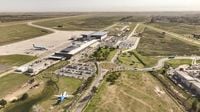Rosario Airport has officially begun handling exports directly, marking a significant shift in Argentina’s air cargo logistics. The Rosario International Airport (AIR) has been authorized as an export point under the Exporta Simple regime, which allows companies in Argentina’s interior to ship products abroad without routing them through Ezeiza, according to a resolution by the General Customs Directorate. This development makes AIR the first inland airport in the country to manage direct exports under this simplified regime, previously restricted to Buenos Aires.
This move is the result of coordinated efforts between the provincial government and national authorities, with Santa Fe’s Minister of Productive Development, Gustavo Puccini, emphasizing the economic and logistical impact of the initiative. “With a focus on productive development and reducing logistics costs in the interior, we’ve secured a measure that will boost exports from Rosario,” he stated.
Operations at the airport will be managed by Panamerican Cargo, which is the first logistics operator in the interior approved under this new system. The company will oversee product shipments through a streamlined process designed to cut down on paperwork, reduce time, and lower costs for entrepreneurs and small to mid-sized enterprises (SMEs). “This authorization offers a window of opportunity for the entire region and the province to enhance logistics,” Puccini added, highlighting the need to actively inform companies about this new export option.
Previously, since its inception in 2017, Exporta Simple had been centralized in Buenos Aires, creating higher costs and added complexity for exporters in the provinces. This new authorization breaks away from that centralist model, allowing Santa Fe to enhance its competitiveness in the regional production network. Transport and Logistics Secretary Mónica Alvarado announced that Sauce Viejo Airport will soon be integrated into the scheme, further strengthening Santa Fe’s logistics capabilities.
Infrastructure upgrades are also part of this initiative, including the expansion of Jorge Newbery Avenue, which provincial authorities believe will improve airport access and enhance overall operational capacity. This combination of policy change and infrastructure investment is expected to significantly bolster the region's export potential.
In a related context, China’s export growth is projected to have slowed sharply in April, likely down to 1.9% year-on-year, a steep decline from 12.4% in March, as reported by Reuters polling expectations. This slowdown is attributed to the impact of new tariffs imposed by the U.S., which have increased to 145%. China's retaliatory tariffs have reached up to 125%, along with restrictions on some U.S. goods, further complicating trade dynamics.
The range of expectations for China’s exports varied widely, from a decrease of 3.5% to a rise of 7.0%. Imports are also expected to fall by 5.9% year-on-year, worsening from a 4.3% drop in March, signaling weak domestic demand in China. As tensions escalate, preliminary U.S.-China trade talks are scheduled for Saturday, May 10, 2025, in Switzerland. However, analysts like Bessent express skepticism, stating, “My sense is this will be about de-escalation.”
These developments highlight a critical moment for international trade, as countries navigate the complexities of tariffs and trade agreements while seeking to bolster their export capabilities. For Argentina, the authorization of Rosario Airport as an export point could be a game-changer, enhancing the region's economic landscape and opening new avenues for local businesses.





